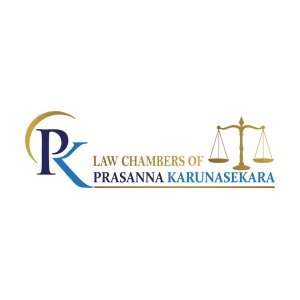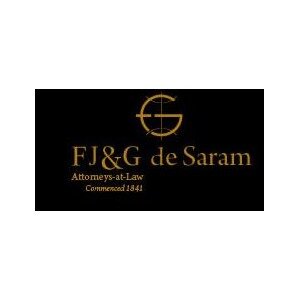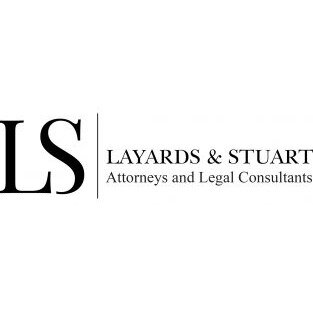Best Funds & Asset Management Lawyers in Sri Lanka
Share your needs with us, get contacted by law firms.
Free. Takes 2 min.
Or refine your search by selecting a city:
List of the best lawyers in Sri Lanka
About Funds & Asset Management Law in Sri Lanka
Funds and asset management is a vital sector in Sri Lanka's financial and economic landscape. It involves the professional management of various securities and assets such as shares, bonds, real estate, and other investment instruments on behalf of individuals or institutional investors. The legal aspects of funds and asset management govern the establishment, operation, supervision, and regulation of these investment vehicles to protect investors, promote market integrity, and ensure compliance with local laws and global standards.
In Sri Lanka, the regulatory environment has continually evolved to foster a robust investment climate, with regulators striving to ensure transparency, fair dealing, and the protection of investor interests. Understanding the fundamentals of funds and asset management law in Sri Lanka is crucial for those investing, managing funds, or providing related services within the jurisdiction.
Why You May Need a Lawyer
Navigating funds and asset management law in Sri Lanka requires a deep understanding of complex regulations and legal procedures. Here are some common situations where consulting a legal expert is essential:
- Structuring or establishing a new investment fund or asset management company
- Compliance with the Securities and Exchange Commission of Sri Lanka (SEC) regulations
- Drafting or reviewing fund prospectuses, offering documents, and investment agreements
- Resolving disputes between investors, fund managers, or third parties
- Advising on tax implications, cross-border investments, and exchange control regulations
- Acquiring or divesting fund interests or managed assets
- Dealing with fund mergers, reorganizations, or liquidation procedures
- Conducting legal due diligence for asset acquisitions or investment opportunities
- Responding to regulatory investigations, audits, or enforcement actions
- Ensuring anti-money laundering (AML) and know your customer (KYC) compliance
Since funds and asset management matters often involve significant sums and complex financial instruments, legal representation helps safeguard your interests and ensures full compliance with Sri Lankan law.
Local Laws Overview
The funds and asset management sector in Sri Lanka operates within a defined legal and regulatory environment. Key legislation and regulatory bodies include:
- Securities and Exchange Commission of Sri Lanka Act - Establishes the Securities and Exchange Commission as the core regulator overseeing the capital markets, including funds and asset managers
- Unit Trust Code - Governs the formation, management, and operation of unit trusts, the most commonly used collective investment schemes in Sri Lanka
- Companies Act, No. 7 of 2007 - Sets out provisions relating to the formation and management of companies, including asset management entities
- Exchange Control Act and Regulations - Regulates foreign investments and repatriation of capital and income for investors
- Financial Transactions Reporting Act - Establishes AML and KYC obligations for fund managers and financial institutions
The SEC issues rules and guidelines periodically to address evolving market needs. Fund managers must also comply with taxation rules set by the Inland Revenue Department. Asset management agreements, disclosures, and advertising must align with statutory and regulatory standards to prevent conflicts of interest, misrepresentations, or misconduct.
Frequently Asked Questions
What is a unit trust, and how is it regulated in Sri Lanka?
A unit trust is a pooled investment fund managed by a professional manager, where investors own units representing their share in the trust's assets. In Sri Lanka, unit trusts are regulated by the Securities and Exchange Commission under the Unit Trust Code, ensuring investor protection and transparency.
Who can act as a fund manager in Sri Lanka?
Only companies licensed by the Securities and Exchange Commission of Sri Lanka can act as fund managers. These companies must meet specified capital, competency, and compliance requirements.
What disclosures must a fund provide to investors?
Funds must provide clear and detailed prospectuses and periodic reports, including information on investment objectives, risks, fees, fund performance, and management practices, to ensure transparency and allow informed decision-making by investors.
Are there any restrictions on foreign investors in Sri Lankan investment funds?
Foreign investors may participate in certain funds, subject to exchange control and SEC regulations. Restrictions may apply to specific sectors or instruments, and approvals or declarations might be needed for inward and outward remittances.
What are the main risks in investing in collective investment schemes?
Key risks include market risk, liquidity risk, manager risk, legal and regulatory risk, and currency risk for cross-border investments. It's essential to review the risk disclosures in fund documents and seek professional advice where necessary.
How are funds taxed in Sri Lanka?
Funds and investors are subject to tax obligations under the Inland Revenue Act. Tax treatment can vary depending on fund structure, income type, and residency of investors. A tax advisor or lawyer can provide guidance tailored to your situation.
What are the compliance obligations for fund managers?
Fund managers must adhere to SEC licensing, reporting, and conduct requirements, as well as antimoney laundering, KYC procedures, and other relevant laws and codes of conduct.
Can funds invest in overseas assets?
Yes, some funds are permitted to invest abroad, but such investments are subject to exchange control laws, SEC conditions, and any sectoral restrictions imposed by the Central Bank or relevant authorities.
How are investor complaints handled?
Investors can lodge complaints with the fund manager or trustee in the first instance. If unresolved, complaints can be escalated to the Securities and Exchange Commission of Sri Lanka, which has powers to investigate and take enforcement action.
What penalties apply for regulatory breaches in funds and asset management?
Breaches can result in fines, reputational harm, suspension or revocation of licenses, and in severe cases, criminal prosecution. Both individuals and entities may be held liable for violations.
Additional Resources
For further information and support in funds and asset management law in Sri Lanka, consider reaching out to the following bodies and resources:
- Securities and Exchange Commission of Sri Lanka
- Colombo Stock Exchange
- Central Bank of Sri Lanka
- Ministry of Finance
- Inland Revenue Department
- Institute of Chartered Accountants of Sri Lanka (for accounting and audit concerns)
- Sri Lanka Bar Association (for certified legal practitioners)
Many of these organizations publish regulations, guidelines, and investor protection materials on fund-related legal requirements.
Next Steps
If you require legal assistance in funds and asset management matters in Sri Lanka, consider the following steps:
- Identify the specific nature of your concern or transaction, such as setting up a fund, resolving a dispute, or ensuring compliance.
- Compile relevant documentation, including investment agreements, disclosures, correspondence, and regulatory notices.
- Seek a qualified lawyer or law firm experienced in funds and asset management law. Consult the Sri Lanka Bar Association or professional networks for recommendations.
- Arrange an initial consultation to outline your requirements, discuss your goals, and evaluate possible legal strategies.
- Follow your lawyer's advice regarding compliance, documentation, negotiations, or dispute resolution steps.
Legal guidance in this area not only protects your interests but also facilitates smooth transactions and compliance, contributing to long-term investment success in Sri Lanka's funds and asset management sector.
Lawzana helps you find the best lawyers and law firms in Sri Lanka through a curated and pre-screened list of qualified legal professionals. Our platform offers rankings and detailed profiles of attorneys and law firms, allowing you to compare based on practice areas, including Funds & Asset Management, experience, and client feedback.
Each profile includes a description of the firm's areas of practice, client reviews, team members and partners, year of establishment, spoken languages, office locations, contact information, social media presence, and any published articles or resources. Most firms on our platform speak English and are experienced in both local and international legal matters.
Get a quote from top-rated law firms in Sri Lanka — quickly, securely, and without unnecessary hassle.
Disclaimer:
The information provided on this page is for general informational purposes only and does not constitute legal advice. While we strive to ensure the accuracy and relevance of the content, legal information may change over time, and interpretations of the law can vary. You should always consult with a qualified legal professional for advice specific to your situation.
We disclaim all liability for actions taken or not taken based on the content of this page. If you believe any information is incorrect or outdated, please contact us, and we will review and update it where appropriate.
Browse funds & asset management law firms by city in Sri Lanka
Refine your search by selecting a city.

















